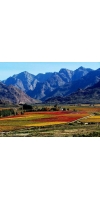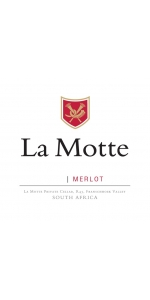Wine from Franschhoek

The Franschhoek Valley is located in the cape of South Africa. Franschhoek is a small wine region that is just east of the Stellenbosch wine region. Vineyards cover the mountainous slopes with Chardonnay, Sauvignon Blanc, Semillon, Cabernet Sauvignon, Chenin Blanc, Shiraz, Merlot, and Pinot Noir being the most popular varieties produced in the region.
The French Huegenots settled the area over 300 years ago, and brought their knowledge of viticulture to the Franschhoek region. After Protestantism was outlawed, Huguenots came to the Cape of Good Hope after fleeing France.
Thirty-seven wine growers collaborated in 1945 and formed the Franschhoek Co-Operative Cellar growing to 95 producers and peaking in 1984. Over the years, some vineyards have been replaced by citrus and fruit trees.
The warm climate is influenced by the sheltering affects of the coastal mountains, which help keep the vines cool and dormant during the cold winter. The vineyards that lie above the snow line can become frozen during the coldest months. Franschhoek enjoys heavy precipitation during the rainy season giving the region alluvial soil.
The Franschhoek Valley is a small wine industry known for estate and boutique wine farms. The growers are specialists and understand the particular needs of each wine.
La Motte Merlot is made from 100 percent Merlot.
La Motte Merlot offers a bouquet of red currants, cherries and spicy oakiness. It is an elegant, well-balanced and juicy wine with an underlying, refreshing quality.
Excellent with lamb, roasts or casseroles.
Review:
"Medium garnet color. Aromas and flavors of smoked meat, toast, leather, grilled plum, baked cherry tart, cracked black pepper, and myrrh with a round, lively, dry medium body and a smooth, interesting, medium-long finish with notes of chocolate-covered pecans with well-integrated, fine, firm tannins and light oak flavor. A savory and juicy Merlot with a strong sense of place; try with most meat dishes."
- Beverage Testing Institute (April 2021), 90 pts
- back
Selected Options
Regions
Categories
Pricing
Countries
Regions
Grape Types
Wineries
Organic/Free Shipping
Laurent-Perrier Cuvee Rose Petal Jacket NV is made Pinot Noir from 10 crus in the Montagne de Reims
After the “Signature”, “Constellation”, “Safari”, “Butterfly” and “Bamboo” robes, Laurent‑Perrier unveils “Petals”. A robe of light where Dalhia or Strelitzia petals are subtly woven in iridescent Pop colours. A harmony of colours in shades of red and pink with highlights of orange or blue, recalling all of the fresh, crisp nuances of the red and black fruit palette of this great rosé champagne.
Laurent‑Perrier has been designing a reusable metal case with its clasp since 2017, to enhance the quality of the wine, matching the generously shaped Cuvée Rosé bottle.
The Cuvée Rosé from Laurent-Perrier is the most recognized rosé champagne in the world. The house uses its proprietary maceration technique and the wine is crafted for a fragrance and not mixed for a color. Held in an elegant bottle inspired by King Henri IV, it has been widely acknowledged for its consistent high quality for more than 40 years, and it is the benchmark for rosé champagne around the world.
Laurent-Perrier Cuvée Rosé is truly remarkable for its highly expressive bouquet, stemming from very careful preservation of fresh fruit aromas during the wine making. Made with 100% Pinot Noir from 10 different "crus " (or villages), from the North and South areas of the Montagne de Reims, as well as the famous village of Bouzy. Grapes from carefully selected plots are meticulously sorted and de-stemmed before going into the vats, and the controlled maceration helps with the color extraction and the development of the full aromatic richness of the Pinot Noir.
Intensely fruity flavors, clean and slightly sharp, the wine opens to the sensation of freshly picked red berries: strawberries, Morello cherries, black currants and raspberries. The finish is supple and rounded.
Its aromatic depth makes it ideal for pairing with marinated raw fish, grilled prawns, exotic dishes, Parma ham and red fruit desserts. Those who are more daring will try it with Asian or Indian cuisine.
Review:
Generosity no less than grace defines this 100% Pinot Noir from ten different crus primarily in the Montagne de Reims. Slightly coppery salmon-pink in the glass, it displays a radiant nose of ripe red berries that pop against glimmers of spiced biscotti and roasted cashew. On a broad palate of pure silk, raspberry and black cherry are underlined by blood-orange rind and crushed rock before a long, almost voluptuous finish that's slightly savory with dried mint.
-Tasting Panel 97 Points
Liminal WeatherEye Vineyard The Mountain Tower is made from 40% Cabernet Franc, 33% Cabernet Sauvignon and 27% Merlot.
All three of these blocks lie quite close together on the steep north-facing side of WeatherEye. Here, full ripeness is reached while preserving great varietal character and lively acidity.
Elegant and evocative aromas of red and black currants, dark plum, violet, Ugandan chocolate, wild tobacco, crushed vanilla bean, and dried thyme. Suave and poised on the palate, with beautifully complex black and blue fruit compote, crushed wild roses, clean tilled dark earth, and windblown herbs. This wine, though drinking great now, is still gathering power, and will age gracefully for many years to come.





